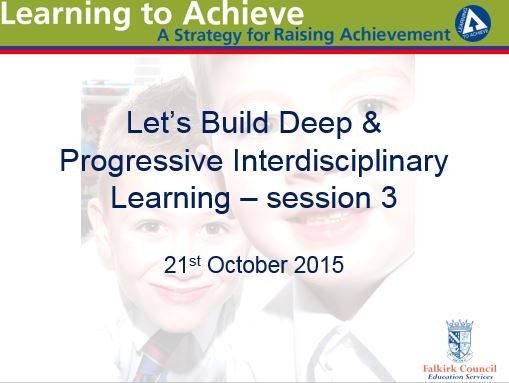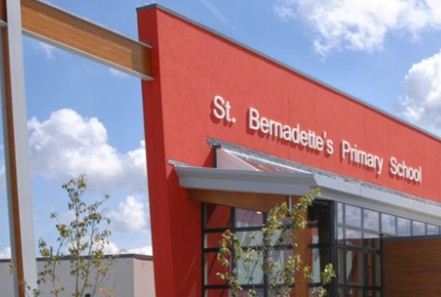![WP_20151105_001[1]](https://blogs.glowscotland.org.uk/fa/public/IDLCentral/uploads/sites/1992/2015/11/WP_20151105_0011.jpg) “In early November 2015, Yvonne McBlain, curriculum support officer with Falkirk Children’s Services enjoyed working with primary and secondary probationer teachers as part of their core induction programme. Click here to see the presentation which the primary teachers experienced, and here to see the adapted version for secondary teachers. You will note that much of the content of these training sessions needed to be similar to reflect the generic nature of interdisciplinary learning and its vital role within Curriculum for Excellence.
“In early November 2015, Yvonne McBlain, curriculum support officer with Falkirk Children’s Services enjoyed working with primary and secondary probationer teachers as part of their core induction programme. Click here to see the presentation which the primary teachers experienced, and here to see the adapted version for secondary teachers. You will note that much of the content of these training sessions needed to be similar to reflect the generic nature of interdisciplinary learning and its vital role within Curriculum for Excellence.
The culminating task for these sessions was to identify small groups of experiences and outcomes which could develop into effective interdisciplinary learning. Practitioners in most schools are engaged in developing interdisciplinary “bundles” of experiences and outcomes to help build their curriculum framework and enable them to ensure progression across all four context for learning. Probationer teachers were shown exemplar pro formas to model how a “bundle” might look when developed further – click here to see a 4th level example, and here to see an early level version.
There was no time during these sessions for proper sharing of the bundles created by each co-operative group of teachers. Consequently, it was agreed that this blog post would be used as a sharing tool, where teachers involved could have a look at some of the bundles, reflect on their IDL value, then leave any comments and observations they have. Yvonne looks forward to hearing your thoughts on the bundles below – some have contexts, and others are simple lists of experiences and outcomes.
MNU 2-09a, 09b, -9c, 10c & TCH 2-22a,03a &01a – Enterprise
SOC 2-07b, SCN 2-16a, 18a, TCH 2-12a & 14a Natural Disasters
HWB 2-08a, 09a, RME 2-09c, 09d, SOC 2-16b, 16c, 17a
SOC 1-16a, 17a, 18a, HWB 1-01a, 02a, 03a, 04a, 05a, 06a, LIT 1-02a, 10a, EXA 1-13a Developing understanding of differences
SOC 1-07a, 08a, 14a, RME 1-03a, 02a, 03b, SCN 1-17a/SOC1-08a Maps/Local Area
RME 2-04c, 06a, 09d, HWB 2-34a, 30a How do beliefs affect diet?
SOC 2-01a,04a, 09a, 14a, EXA 2-03a, 04a, 05a, 13a, TCH 2-04a, 14a, Titanic
MNU 1-20b, MTH 1-21a, HWB 1-50a, SCN 1-02a, SOC 1-13b Living things & environment
LIT 3-23a, & geography, RMPS & Maths outcomes to study potential support of local charities and campaigners using the big questions “Can people make a difference?”
HWB 4-29a, 30a, 32a, SOC 4-22b, 21a & MNU Cupcake Challenge enterprise
TCH, SOC & SCN at 3/4th level – Understanding physical, social and technological developments in society
Click here for booklet versions of the experiences and outcomes, and here for a document which collates the connections between subjects as described in each principles and practice paper.



